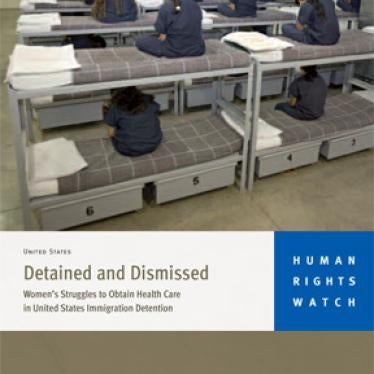"I was starting to go blind," said Mary T. A diabetic, she was being held by US immigration authorities when her vision began to fail. I could only see shades of people," she said, "I couldn't see numbers or letters." She repeatedly complained to her jailers, but received no medical care for 15 days as her condition worsened. When a nurse was finally summoned, Mary T. recalled, the nurse asked her, "Why didn't you tell us?"
For Mary T., who regained her sight, and the thousands of other women detained each year by the US Immigration and Customs Enforcement (ICE), speaking up about health problems is not enough. Two new reports, one from Human Rights Watch and the other from the Florida Immigrant Advocacy Center (FIAC), document dozens of cases in which the immigration agency's medical staff either failed to respond to health problems of women in detention or responded only after considerable delays.
"Women in detention described violations such as shackling pregnant detainees or failing to follow up on signs of breast and cervical cancer, as well as basic affronts to their dignity," said Meghan Rhoad, researcher in the women's rights division at Human Rights Watch. "Because immigration detention is the fastest-growing form of incarceration in the United States, these abuses are especially dangerous. They remain largely hidden from public scrutiny or effective oversight."
Human Rights Watch researchers visited nine detention centers in Florida, Texas, and Arizona, and interviewed 48 women detained or recently released from immigration detention, as well as detention facility staff and health care providers, immigration officials, immigration attorneys and advocates. The FIAC report is based on interviews, phone conversations and correspondence with detainees and jail and immigration officials. It also includes information from US government materials, newspaper articles and other data.
Women described struggling to obtain potentially life-saving services such as Pap smears to detect cervical cancer, mammograms to check for breast cancer, pre-natal care, counseling for survivors of violence, and even basic supplies such as sanitary pads or breast pumps for nursing mothers. The obstacles to health services included inadequate communication about available services, unexplained delays in treatment, unwarranted denial of services, breaches of confidentiality, and failure to transfer medical records. When women were denied services, complaint mechanisms were ineffective, according to the two reports.
More than 300,000 people were in immigration custody in 2008; women accounted for about 10 percent of the total. Immigration law violations are civil infractions, and detainees are held in administrative - not punitive - custody. The average stay is 38 days, but some detainees are held for months and even for years.
Under international standards, detainees are entitled to the same level of medical care as individuals in the community at large. Still, the researchers found a disturbing pattern of neglect. Before her detention, Lucia C., was told by her doctor to have semi-annual Pap smears because the results of her most recent procedure showed abnormalities. When she was detained at a county jail in New Jersey, authorities rebuffed her request for the procedure. "I was supposed to be checked every six months," she told Human Rights Watch. "I asked my daughter to send the records. I got it and I brought it to medical so they could see I'm not lying. I have asked a lot of times." Despite her efforts, Lucia C. did not receive a Pap smear over the 16 months spent in detention. "It's terrible because you feel like you have something you can die for ... and you don't have no assistance."
ICE health-care policy focuses on emergency care. Most of the difficulties arise when detainees require non-emergency care. ICE policy governing off-site medical visits permits non-emergency care only when lack of treatment would "cause deterioration of the detainee's health or uncontrolled suffering affecting his/her deportation status." This policy exists alongside a set of detention standards that were recently revised to upgrade medical care requirements for facilities, but that are not to take effect until 2010. For some of the women currently in custody, they may come too late.
BASIC FACTS
ICE detains individuals at more than 500 facilities nationwide; Division of Immigration Health Services (DIHS) personnel provide on-site medical services at 21 of these. At other facilities, medical care is contracted out along with other detention functions.
Women constitute 10 percent of the immigration detention population, currently a total of about 30,000 on any given day.
Women detainees are held in more than 300 facilities.
Half of the women Human Rights Watch interviewed said they had experienced delays in receiving requested medical care and nearly as many were forced to make repeated appeals to obtain an appropriate response to their medical concerns.
RECOMMENDATIONS
- Ensure that those currently detained are fairly and quickly considered for release and alternatives to detention;
- Issue federal regulations so that ICE detention standards have the force of law, and detained individuals and their advocates have recourse to courts to redress shortfalls in health care;
- Revamp and improve policies limiting access to non-emergency services;
--Stop detaining women who are suffering the effects of persecution or abuse, or who are pregnant or nursing infants;
- Adopt specific standards addressing women's health services, including reproductive health services; and
- Prohibit the shackling of pregnant women.






